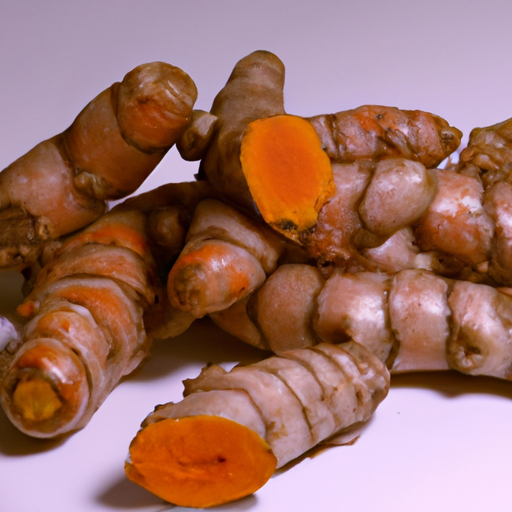Are you searching for a natural solution to reduce inflammation in your body? Turmeric, a commonly used spice in Indian and Middle Eastern cooking, has been utilized for generations due to its anti-inflammatory benefits. Scientific research has demonstrated that curcumin, the main component in turmeric, can help alleviate inflammation and pain in the body.
However, not all turmeric is created equal when it comes to its anti-inflammatory effects. In this article, we will explore the different varieties of turmeric and factors that affect its potency. You will learn how to choose the right form of turmeric, whether it be fresh, powdered, or in supplement form, to best combat inflammation.
We will also compare the anti-inflammatory effects of different forms of turmeric and provide tips for incorporating it into your diet. So, let’s dive in and discover what type of turmeric is best for inflammation.
Key Takeaways
- Choose a high-quality variety of turmeric for anti-inflammatory properties.
- Minimal processing and proper storage increase potency.
- Supplements offer a more concentrated dose and may be more effective than fresh turmeric.
- Organic turmeric is recommended to avoid harmful pesticides.
Overview of Turmeric and its Anti-inflammatory Properties
So, if you’re looking to fight inflammation, you’ll be happy to know that turmeric is a spice that’s got your back! This ancient herb has been used for centuries in traditional medicine to treat a variety of ailments, and modern research has shown that turmeric contains compounds with potent anti-inflammatory properties.
Curcumin, the main active ingredient in turmeric, has been shown to reduce inflammation in the body and may even have anti-cancer properties. You can get the benefits of turmeric by incorporating it into your cooking or taking turmeric supplements.
Adding turmeric to your diet is easy – it can be used in a variety of dishes, from curries to smoothies. You can also take turmeric supplements if you’re looking for a more concentrated source of curcumin. However, it’s important to note that curcumin is not easily absorbed by the body, so it’s important to choose a supplement that contains piperine, a compound that enhances curcumin absorption.
With that said, let’s take a look at the different varieties of turmeric and which one is best for inflammation.
Different Varieties of Turmeric
One thing to keep in mind is that not all turmeric is created equal, and it’s important to choose the right variety for your needs.
There are several different varieties of turmeric that are commonly used in cooking, including Indian turmeric, Javanese turmeric, and Hawaiian turmeric.
Each of these varieties has a slightly different flavor profile and can be used for different culinary purposes.
Indian turmeric is the most common variety and is widely used in Indian cuisine. It has a bright yellow color and a slightly bitter flavor.
Javanese turmeric, on the other hand, has a more floral flavor and is often used in Indonesian and Malaysian dishes.
Hawaiian turmeric has a more mild flavor and is often used in sweet dishes like smoothies and desserts.
When choosing turmeric for its anti-inflammatory properties, it’s important to choose a high-quality variety that is rich in curcumin, the active ingredient that gives turmeric its anti-inflammatory properties.
This will be further discussed in the next section about factors that affect the potency of turmeric.
Factors that Affect the Potency of Turmeric
To get the most out of your turmeric, you’ll want to know what factors affect its potency. Factors that can affect the potency of turmeric include processing and storage. How turmeric is processed and stored can determine how potent it is in terms of its anti-inflammatory properties.
Processing involves how the turmeric is harvested, cleaned, and ground. Turmeric that undergoes minimal processing is considered to be more potent because it retains more of its natural compounds. On the other hand, turmeric that has been heavily processed or has additives may have reduced potency. Storage is also a crucial factor in preserving the potency of turmeric. Exposure to light, air, heat, and moisture can cause the breakdown of turmeric’s active compounds, resulting in decreased potency over time.
| Factors | Potency |
|---|---|
| Minimal processing | Higher potency |
| Heavy processing or additives | Reduced potency |
In addition to processing and storage, the type of turmeric used can also impact its potency. In the next section, we’ll discuss how to choose the right form of turmeric for your needs.
Choosing the Right Form of Turmeric
When it comes to getting the most out of this powerful spice, knowing how to choose the right form of it can make a significant difference in its effectiveness, especially if you’re looking to add some pizzazz to your meals. Here are some factors to consider when choosing the right form of turmeric:
-
Turmeric powder vs supplements: Turmeric powder is the most commonly used form of turmeric and is easily found in most grocery stores. It can be used in cooking and added to smoothies or other beverages. Supplements, on the other hand, offer a more concentrated dose of curcumin, the active ingredient in turmeric, and may be more effective for therapeutic purposes.
-
Fresh vs dried turmeric: Fresh turmeric is a less common form of the spice but can be found at specialty stores or farmers’ markets. It has a more potent flavor and aroma than dried turmeric. Dried turmeric, however, is more commonly used and is found in most spice racks. It can be used in cooking and added to tea or other beverages.
-
Organic vs conventional: Choosing organic turmeric ensures that the spice has not been exposed to harmful pesticides and chemicals. Conventional turmeric, on the other hand, may contain these harmful substances.
-
Quality and freshness: When choosing turmeric, look for bright orange-yellow color and a strong aroma. Old or low-quality turmeric may not have the same potency or flavor as fresh, high-quality turmeric.
Choosing the right form of turmeric can make a significant difference in its anti-inflammatory effects. In the next section, we’ll compare the anti-inflammatory effects of different forms of turmeric.
Comparing the Anti-inflammatory Effects of Different Forms of Turmeric
Discover the benefits of experimenting with various forms of turmeric for your meals and health – it’s worth comparing the effectiveness of different forms in reducing inflammation.
Fresh turmeric root is known for its robust flavor and vivid color, which can add an intense depth to your dishes. It also contains a high amount of curcumin, a potent anti-inflammatory compound that has been shown to alleviate pain and swelling.
However, fresh turmeric may not be as convenient to use as its powdered or supplement counterparts. Turmeric powder is a great option for those who want to add a subtle, earthy flavor to their meals. But, while it contains curcumin, it may not be as effective as supplements that contain concentrated doses of this compound.
Additionally, some supplements may contain additives or low-quality ingredients that could potentially cause negative side effects. It’s important to do your research and choose a high-quality supplement that is free of harmful additives.
With these considerations in mind, you can find the best form of turmeric for your health needs. Now, let’s explore some tips for incorporating turmeric into your diet without compromising on taste or health benefits.
Tips for Incorporating Turmeric into Your Diet
Spice up your meals and boost your health by easily incorporating turmeric into your diet with these tips.
One way to incorporate turmeric into your meals is by using it as a spice. Turmeric can be added to soups, stews, curries, and roasted vegetables to give them a warm, earthy flavor. You can also add turmeric to your morning smoothie or oatmeal for a healthy start to your day.
Another way to incorporate turmeric into your diet is by taking turmeric supplements. Turmeric supplements are available in capsule or powder form and can be taken daily to help reduce inflammation. However, it’s important to consult with your healthcare provider before taking any supplements, as they may interact with other medications or have potential side effects.
With these tips, you can easily incorporate turmeric into your diet and reap its anti-inflammatory benefits.
In the next section, we’ll explore other health benefits of turmeric.
Other Health Benefits of Turmeric
You might be surprised to learn that incorporating turmeric into your diet may be beneficial for more than just reducing inflammation. Recent studies have shown that turmeric has a variety of health benefits. These benefits include improving brain function and reducing the risk of certain diseases.
The active ingredient in turmeric, curcumin, has been shown to boost levels of a hormone called brain-derived neurotrophic factor (BDNF). This hormone is responsible for creating new neurons and improving brain function. Additionally, curcumin has been linked to a reduced risk of heart disease, Alzheimer’s disease, and various types of cancer.
Turmeric also has a variety of culinary uses, making it an easy spice to incorporate into your meals. It can be added to rice or quinoa dishes, used to spice up roasted vegetables, or even added to smoothies for a healthy boost. However, it’s important to note that while turmeric is generally safe for consumption, it can interact with certain medications and may cause stomach upset in some individuals.
In the next section, we will discuss precautions and potential side effects to keep in mind when incorporating turmeric into your diet.
Precautions and Potential Side Effects
Now that you know about the other health benefits of turmeric, it’s important to take precautions and be aware of potential side effects. While turmeric is generally safe for most people when used in recommended doses, it can cause stomach upset and may interact with certain medications.
If you have a history of gallbladder problems or are taking blood thinners, it’s important to speak with your healthcare provider before taking turmeric supplements. It’s also important to follow dosage recommendations when taking turmeric supplements.
The recommended dosage can vary depending on the form of turmeric you’re taking and the reason for taking it. It’s always best to follow the instructions on the label or to consult with a healthcare professional to find the right dosage for you. By taking these precautions and following dosage recommendations, you can safely enjoy the many health benefits of turmeric.
Moving on to the next topic, scientific research on turmeric and inflammation has shown promising results.
Scientific Research on Turmeric and Inflammation
Get excited about the potential benefits of using turmeric to combat inflammation! Scientific research has shown that turmeric, a spice commonly used in Indian cuisine, has anti-inflammatory properties. These properties come from the active ingredient in turmeric called curcumin, which has been shown to reduce inflammation in the body.
In addition to reducing inflammation, turmeric may also have benefits for the skin. Studies have shown that turmeric can help improve skin conditions such as acne, psoriasis, and eczema.
While turmeric can be consumed in food, some people prefer taking turmeric supplements to ensure they’re getting a consistent and effective dose. However, it’s important to note that the effectiveness of turmeric supplements can vary depending on the quality of the product and how it’s absorbed by the body.
Frequently Asked Questions
Can turmeric be harmful if consumed in large quantities?
While turmeric has numerous health benefits, including reducing inflammation, consuming large quantities can have potential risks such as gastrointestinal issues. It’s important to follow dosage recommendations and consult with a healthcare professional, especially if you have certain medical conditions that may interact with turmeric. Remember, moderation is key.
How does the quality of the turmeric affect its anti-inflammatory properties?
To maximize the anti-inflammatory benefits of turmeric, consider the quality of the product. Purity and potency are key factors, as well as sourcing ethics. Processing, such as raw vs cooked and extraction methods, can also impact effectiveness.
Is it safe to take turmeric supplements while pregnant or breastfeeding?
To ensure safety, consult with a healthcare provider before taking turmeric supplements during pregnancy or breastfeeding. While it may provide benefits, dosages and potential risks should be discussed. Side effects like nausea, diarrhea, and uterine contractions may occur.
How long does it take for turmeric to start showing its anti-inflammatory effects?
To experience anti-inflammatory benefits of turmeric, take a standardized turmeric extract containing 400-600mg of curcuminoids, the active ingredient. Effects may be seen in 1-2 weeks. Different types of turmeric extracts may have varying benefits timelines.
Are there any foods or medications that should be avoided while taking turmeric supplements?
Be cautious when taking turmeric supplements as they may interact with certain foods and medications. Avoid taking high doses and consult with a healthcare provider. Focus on turmeric dosage for inflammation and watch for potential interactions.
Conclusion
Congratulations! You now know all about the different types of turmeric and which one is best for inflammation. Based on the factors we’ve discussed, it’s clear that the curcumin content and the form of turmeric are the two most important factors to consider.
Remember that not all turmeric supplements are created equal, and it’s important to do your research and choose a high-quality product to ensure maximum benefits. Did you know that turmeric was found to be as effective as ibuprofen in reducing pain and inflammation in patients with osteoarthritis, according to a study published in the Journal of Alternative and Complementary Medicine?
This is just one example of the many scientific studies that have demonstrated the powerful anti-inflammatory effects of turmeric. So, if you’re looking for a natural way to manage inflammation and improve your overall health, turmeric may be just what you need.
Incorporating turmeric into your diet is easy and delicious. You can add it to your favorite recipes, make a turmeric latte, or take a turmeric supplement. Just be sure to follow the recommended dosage and talk to your healthcare provider before starting any new supplement regimen.
With its numerous health benefits and proven anti-inflammatory effects, turmeric is definitely worth adding to your daily routine.










